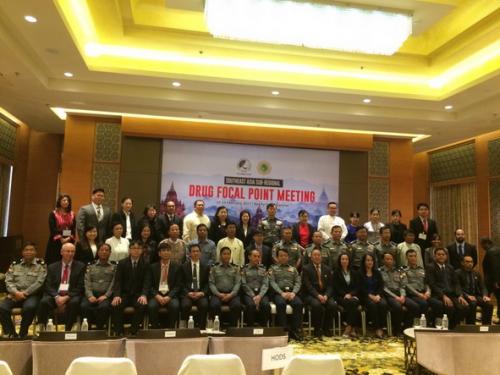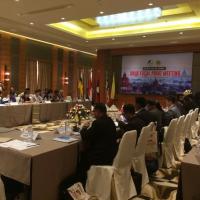ONCB attended the Southeast Asia Sub-region Focal Point Meeting at Nay Pyi Taw, Republic of the Union of Myanmar
News / View / ASEAN Information
Wednesday 22nd of February 2017
ONCB attended the Southeast Asia Sub-region Focal Point Meeting at Nay Pyi Taw, Republic of the Union of Myanmar

On Wednesday 22 February 2017, 09.00 hrs., Mr. Niyom Termsrisuk, Deputy Secretary-General, NCB as the head of Thai Delegations with ONCB officers attended the Southeast Asia Sub-regional Focal Point Meeting (The second day) at Nay Pyi Taw, Republic of the Union of Myanmar. The meeting was organized by Colombo Plan Drug Advisory Programme (CPDAP) in order to analyze situation and drug abuse population static, to present the national strategies and drug abuser solution, to analyze service problem on drug abuser and discuss on involved other matters for Southeast Asia regional cooperation in the future.
On the first day of the meeting, Police Major General Zaw Win, Director-General of Myanmar Police as the Secretary-General of Central Committee for Drug Abuse Control (CCDAC) and the host country with Mr. Kinley Dorji, Secretary-General of Colombo Plan Secretariat (CPS) addressed welcoming speech in the opening ceremony.
The Secretary-General of CPS and representative of CPDAP presented the background, structure of Colombo Plan (CP) as well as implementation of programmes under CP, for example CPDAP and International Centre for Credentialing and Education of Addiction Professionals (ICCE). Afterwards, Each of Southeast Asia member of CPDAP presented current drug situation of their country.
On Thursday 23 February 2017, 09.00 hrs., the meeting presented international cooperation on drug prevention and rehabilitation, alternative development in Chan state area and initiative to combat on drug problem with the Australian Federal Police (AFP). Moreover, Thailand presented the working experience with CPDAP throughout 12 years to organize “The International Training Course on Precursor Chemical Control”. The result of the training was that the trainees had opportunity to present drug situation in their country and also exchange working experience together that would benefit for coordination.
In the afternoon, the member countries attended the working group session to discuss and exchange experience together on 3 aspects: Drug Law Enforcement, Drug Prevention and Rehabilitation. Members of each group shared the information of their country and comment about obstacle and implementation problem, recommendation and the path of international cooperation in the future.



